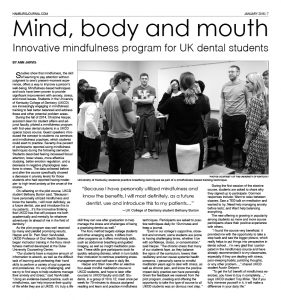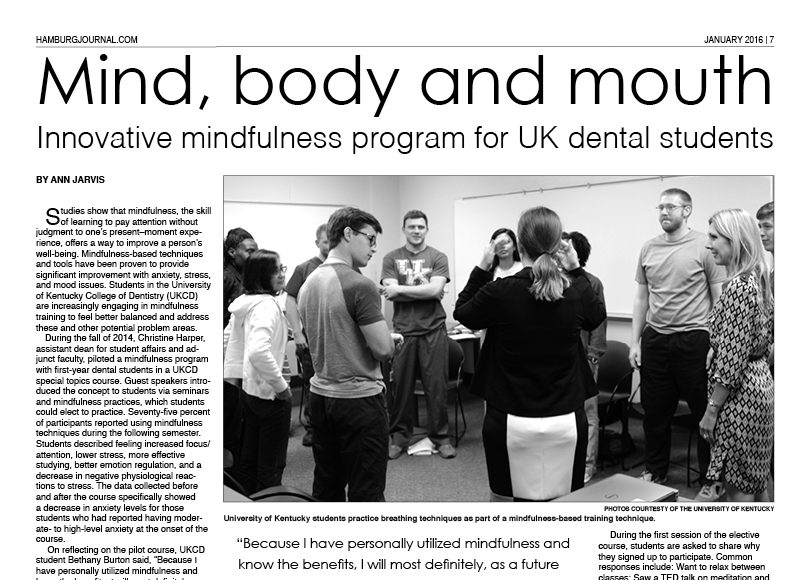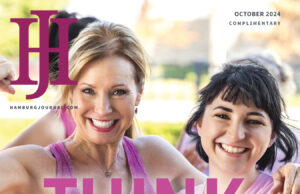Mind, Body, and Mouth: Innovative mindfulness program for UK dental students
BY ANN JARVIS
 Studies show that mindfulness, the skill of learning to pay attention without judgment to one’s present–moment experience, offers a way to improve a person’s well-being. Mindfulness-based techniques and tools have been proven to provide significant improvement with anxiety, stress, and mood issues. Students in the University of Kentucky College of Dentistry (UKCD) are increasingly engaging in mindfulness training to feel better balanced and address these and other potential problem areas.
Studies show that mindfulness, the skill of learning to pay attention without judgment to one’s present–moment experience, offers a way to improve a person’s well-being. Mindfulness-based techniques and tools have been proven to provide significant improvement with anxiety, stress, and mood issues. Students in the University of Kentucky College of Dentistry (UKCD) are increasingly engaging in mindfulness training to feel better balanced and address these and other potential problem areas.
During the fall of 2014, Christine Harper, assistant dean for student affairs and adjunct faculty, piloted a mindfulness program with first-year dental students in a UKCD special topics course. Guest speakers introduced the concept to students via seminars and mindfulness practices, which students could elect to practice. Seventy-five percent of participants reported using mindfulness techniques during the following semester. Students described feeling increased focus/attention, lower stress, more effective studying, better emotion regulation, and a decrease in negative physiological reactions to stress. The data collected before and after the course specifically showed a decrease in anxiety levels for those students who had reported having moderate- to high-level anxiety at the onset of the course.
On reflecting on the pilot course, UKCD student Bethany Burton said, “Because I have personally utilized mindfulness and know the benefits, I will most definitely, as a future dentist, use and introduce this to my patients…It’s the innovative thinking that UKCD has that will prepare me both academically and mentally for whatever adventures lie ahead of me in the field of dentistry.”
As the pilot program was well received by many and yielded promising results, Harper and Dr. Pam Stein VanArsdall, UKCD Professor of Oral Health Science, began instructor training in the Koru mindfulness method developed at the Duke University Counseling Center.
“Our students have a massive amount of information to absorb, as well as the difficult task of learning and perfecting their hand skills to perform a variety of oral surgeries and procedures. It’s very challenging, and we try to find ways to help students manage their anxiety and stress,” said VanArsdall. “Using an evidence-based practice, such as mindfulness, can help improve their quality of life while they are at UKCD. It’s truly a life skill they can use after graduation to help manage the stress and challenges of being a practicing dentist as well.”
The Koru method targets college students and other emerging adults. It differs from other programs as it offers mind-body skills, such as abdominal breathing and guided imagery, as well as insight meditation practice. These skills give participants tools for quickly reducing distress, which in turn builds their motivation to continue practicing stress management and self-care in daily life.
Harper and Stein now offer an elective four-week mindful meditation course to UKCD students, and hope to later offer courses to UKCD faculty and staff. Students, in a group of 10 to 12, meet once per week for 75-minutes to discuss assigned reading and learn and practice mindfulness techniques. Participants are asked to practice techniques daily for 10-minutes and keep a journal.
“Even in our college’s supportive, close-knit environment, some students are prone to having challenging times, whether it be with confidence, stress, or concentration,” said Harper. “The chronic stress that many of our students face, as they balance the rigors of the curriculum, lowers their resiliency and can cause systemic health concerns. I personally came to mindful meditation years ago to deal with stress, as well as chronic pain, and know the positive impact daily practice can have personally. Given the feedback we received from the pilot program, creating and offering the opportunity to take this type of course to all UKCD students was an obvious next step. ”
During the first session of the elective course, students are asked to share why they signed up to participate. Common responses include: Want to relax between classes; Saw a TED talk on meditation and wanted to try; Need help managing anxiety before tests; and Want help balancing everything.
The new offering is growing in popularity among students as more and more course participants share their positive experience with others.
“I found the course very beneficial. It provided me with the opportunity to take a step back and see the bigger picture, which really helps to put things into perspective in dental school…I’m very glad that I participated in the mindfulness course and have already recommended it to my classmates, especially if they are dealing with stress, poor-sleeping habits, jumbling thoughts, or any other problem…,” shared UKCD student Austin Delpont.
“To get the full benefit of mindfulness exercises, you have to buy in completely…,” says UKCD student Troy Miller. “But if you fully immerse yourself in it, it will make a difference in your daily life.”
This article also appears on page 7 of the January 2016 issue of the Hamburg Journal.
For more Hamburg area news, subscribe to the Hamburg Journal weekly digital newsletter.












